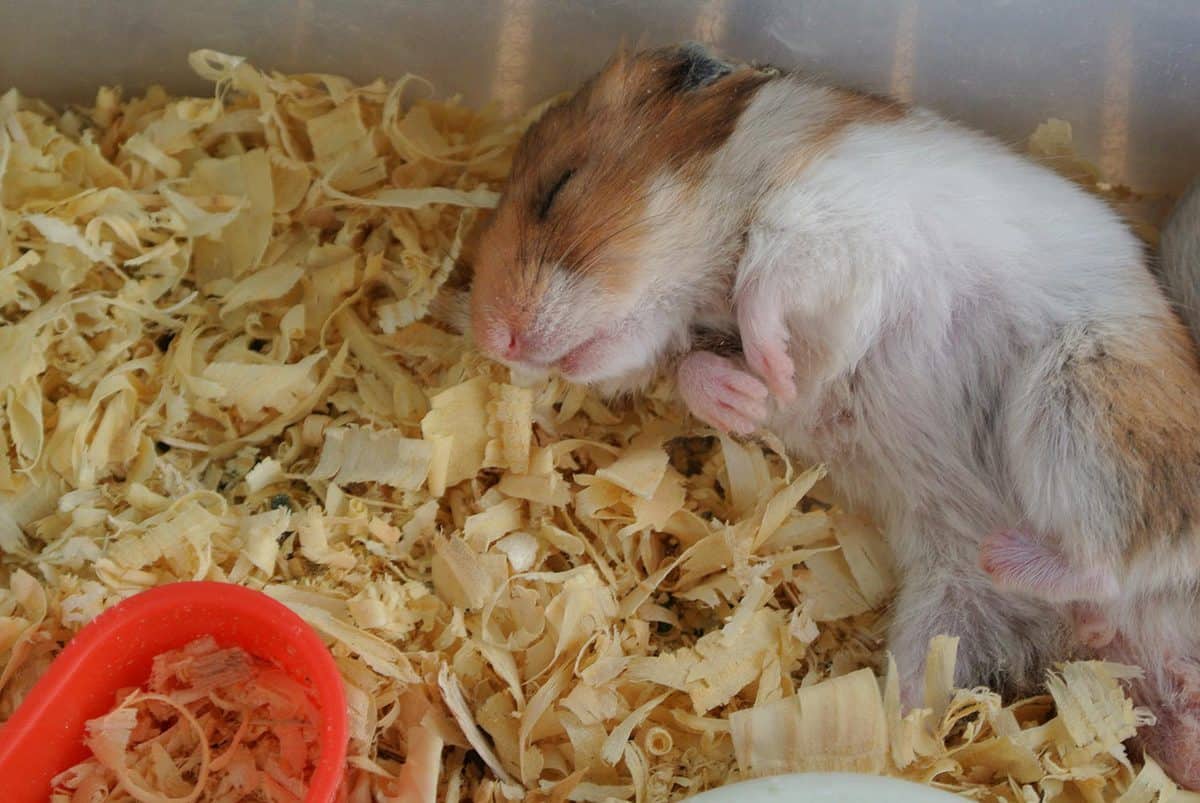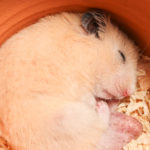People like to keep hamsters as pets. You might want to know when your hamster will be awake and ready to play when you get one.
People often think that hamsters are active at night, but this isn’t always the case. We’ve looked into when your hamster will be awake and ready to play.
Hamsters are most active when the sun is going down or just before it rises. Depending on their breed and personal needs, different hamsters will wake up and go to sleep at different times.
Do Hamsters sleep?
Now that you know when your hamster might be awake, keep reading to find out more about when they wake up and go to sleep.
We’ll talk about why hamsters don’t sleep at night and if it’s normal for them to be active during the day.
Especially if you’re a new hamster owner, it can sometimes seem like your hamster just sleeps all the time.
So, if you just got your first hamster and are worried that something is wrong with her because she sleeps so much, there is something you should know about how hamsters sleep.
Scientists aren’t sure if hamsters are truly nocturnal, which means they are active at night, or if they are crepuscular, which means they are active in low light and at dawn/twilight.
In either case, hamsters usually sleep during the day and are more active at night or when the sun is almost or completely hidden.
Evolutionarily speaking, the reason why hamsters sleep and wake up at the same time is simple: many wild hamsters live in places that get very hot during the day.
So, the wild hamster changed in two important ways to stay cool during the day.
They live in underground burrows and sleep during the day. At night, they hunt, mate, and hang out with each other.
As well, the small and (it seems) tasty hamster is a popular prey animal in the wild. Here, it makes sense to sleep underground in cool burrows during hot days when most predators are awake and on the hunt.
From a big picture point of view, wild hamsters have changed over thousands of years to sleep during the day.
So, it’s true that pet hamsters don’t have to worry about surviving as their wild cousins do, but from a DNA/evolutionary point of view, they might not know this yet.
In fact, it wasn’t until 1930 that the first wild hamsters came to the West. At first, they were supposed to be “lab rats” (literally).
Hamsters had so many babies and were so friendly and cute that it was inevitable that they would become pets.
So, even though hamsters have been kept as pets for less than 100 years, they still sleep and wake up in the same way they did when they were wild animals.
When do hamsters sleep?
Hamsters really need to sleep as much as they need to during the day.
If they don’t get enough sleep during these times every day, their health can start to get worse. They can also feel more stressed, which can make them angry or even bite.
As with people who don’t get enough sleep, hamsters who don’t get enough sleep also have trouble remembering things and doing daily tasks.
In some cases, a hamster’s life can be cut short by not getting enough sleep on a regular basis.
So it’s clear that you don’t want any of these things to happen to your sweet baby! If you take the time to learn more about hamster sleep patterns, including how they have changed over time in the wild, you can give your new pet hamster the best possible home.
How Long Do Hamsters Sleep?
Hamsters usually sleep 12 to 14 hours a day, but unlike humans, who usually only sleep once a day, hamsters sleep and wake up at different times throughout the day.
This means that they sleep more than once a day, so the 12–14 hours will be broken up into smaller chunks.
Hamster Sleep Cycle
Many circadian rhythm sleep studies have been done on hamsters, especially Syrian or golden hamsters. This means that we know a lot about how hamsters sleep.
Up to 25% of the time people sleep, they are in the REM (rapid eye movement) phase, and studies show that hamsters are in this phase for about the same amount of time.
3 People often say that dreaming happens during the REM phase of sleep, but despite the research that has been done, no one knows if hamsters dream as people do.
You may see your hamster twitch its paws or eyes, which many people think is a sign that it is dreaming of doing something else with its brain. If you see these things while your hamster is sleeping, don’t worry.
Another important thing to know about hamsters is that they sleep at night when they are kept as pets.
4 This means that, unlike most people, they are awake at night and sleep during the day. Some people, of course, work at night, so they sleep during the day like hamsters.
But most hamster owners will find that their hamsters are most active when they are in bed fast asleep.
What If Your Hamster Is Sleeping More Than Usual?
Your hamster may be sick or hibernating if it sleeps more than usual. Your hamster might go into hibernation if it lives in a cold place where the temperature often drops below 50 degrees.
Even though most homes don’t get this cold, your hamster’s cage may be colder than the rest of your house if it is near an outside wall with poor insulation or a draughty door or window. Before you think your hamster is sick, make sure it has enough heat.
If your hamster’s cage is always warmer than 50 degrees and it sleeps more than usual, it may be sick. Hamsters often have problems with their lungs and stomachs.
If yours isn’t feeling well, it may be lazy and sleep most of the time. If you think your hamster is sick, you might want to take it to the vet.
If your hamster’s cage is always over 50 degrees and it isn’t sick, it may just be getting older and sleeping more. Older hamsters don’t sleep as deeply or as long as younger ones, so they sleep more. 5 This is a normal thing that shouldn’t worry you.
How to improve a hamster’s sleeping cycle
Sleep is just as important to the health of a hamster as it is to the health of any other pet. To make sure your hamster sleeps for 6 to 8 hours, you need to pay attention to a few things that can affect their sleep cycle. Here’s how it works:
Give them a clean bed to sleep in:
In the wild, hamsters sleep and hide in holes they have dug. A burrow is for your hamster to feel warm, safe, and comfortable.
You need to make their cage look like that. Your hamster will take care of the rest if you give them a place to hide and clean bedding.
Try not to move or shift their bed without a good reason, as hamsters are very sensitive about it.
Lessen the amount of light and noise:
You should put your hamster’s cage in a quiet, dark place away from other animals. Hamsters can be woken up by even quiet sounds, so keep the area safe from strangers and other family members.
Also, make sure the place is far from your bed so your nocturnal hamster won’t wake you up by playing or running around at night.
Check to see that the room is not cold:
The temperature of the room can have a big effect on how a hamster sleeps. If their cage is put in a place that is too cold, their instincts to hibernate will kick in and they will sleep most of the day.
The best temperature for a hamster’s room is between 68 and 75°F (20 and 24°C), so make sure it doesn’t go above that.
Why You Shouldn’t Disturb A Sleeping Hamster
Most hamsters sleep during the day, so it’s not a good idea for their owners to wake them up to play or interact with them. Even though this may seem harmless, hamsters hate being woken up in such a harsh way.
Right now, if you try to get close to them, they might get mad and bite you. But in the long run, your hamster will start to feel like it doesn’t get enough sleep, and that won’t be good for its health.
In the long run, not getting enough sleep can cause a number of health and behavior issues. Your hamster will get stressed out, anxious, forget things, and become more aggressive.
It will also have an effect on your hamster’s overall health and start taking years off their life.
That’s why your hamster needs to sleep at least 6 to 8 hours every day. If your schedule doesn’t allow you to spend time with your pet and play with it, you can try some of the techniques we’ll talk about below to find a middle ground or gently wake up your hamster so you can spend time with it.
What Time Do Hamsters Typically Wake Up?
As we’ve already talked about, hamsters are most active in the morning and evening. Most hamsters stay hidden during the day and sleep at night.
They did this because predators can’t see them well at night and it’s too hot where they come from during the day.
This means that most hamsters are not nocturnal, as many people think. Instead, they are active during the day. But different hamsters will be more active at different times.
Some will be more active at night, while others will be more active in the morning.
Because this is when they would normally look for food in the wild, your pet is most likely to be awake around sunset.
Also, many hamsters who live in homes tend to be more active at night because their owners go to bed and it gets dark and quiet.
Hamsters are naturally nervous because they are prey animals, so they tend to be more active when it is quiet.
Is It Normal For Hamsters To Be Awake In The Morning?
Hamsters are used to being awake during the day. Because of how they sleep, they may be awake for short amounts of time during the day.
Some breeds are more likely to be awake during the day. White Winter dwarfs, Russian Campbell dwarfs, and Roborovskis are the names of these breeds. Roborovskis are the most likely of these breeds to be awake during the day.
They might wake up during the day if they get hungry, thirsty, or need to use the bathroom. Hamsters have good hearing, so loud noises like a vacuum or music can easily wake them up.
Some people have noticed that their hamster seems to sleep more at night than during the day. This can be normal in captivity.
Pay attention to how your pet sleeps and wakes up, and keep an eye out for any changes. When your pet is sick, he or she might sleep too much or too little.
Can I Wake My Hamster While It Sleeps?
Hamsters are used to being awake during the day. Because of how they sleep, they may be awake for short amounts of time during the day.
Some breeds are more likely to be awake during the day. White Winter dwarfs, Russian Campbell dwarfs, and Roborovskis are the names of these breeds. Roborovskis are the most likely of these breeds to be awake during the day.
They might wake up during the day if they get hungry, thirsty, or need to use the bathroom. Hamsters have good hearing, so loud noises like a vacuum or music can easily wake them up.
Some people have noticed that their hamster seems to sleep more at night than during the day. This can be normal in captivity.
Pay attention to how your pet sleeps and wakes up, and keep an eye out for any changes. When your pet is sick, he or she might sleep too much or too little.
What Does It Mean If My Hamster Is Sleeping Too Much?
Once you learn how your hamster sleeps, you will be able to tell if they are sleeping more than usual. This is important to notice because it could mean your hamster is sick, their sleep schedule is off, or they are hibernating.
When a hamster is sick, it will sleep more and eat less. It may also have diarrhea or loose fur. Take your hamster to the vet if you notice it isn’t playing as much as usual. Check on your hamster if you haven’t seen it for a few days to make sure it’s okay.
If your hamster is always getting woken up, it might need to sleep more. If they seem to be sleeping a lot but don’t seem sick, make sure their cage is in a quiet place and not in direct sunlight.
If it is too cold or dark, they may go into hibernation. To keep this from happening, make sure their cage stays between 65 and 75 degrees and has a regular pattern of light and dark.
Conclusion
You no longer have to worry about why your hamster sleeps so much. It’s in their genes to sleep when most predators are moving around and it’s too hot outside to look for food.
They like to hunt for seeds and puddles at dusk when it’s both safer and cooler. Don’t try too hard to make your hamster’s schedule fit yours.
Find something you both like to do, like in the evening. You can let your hamster out of his cage after dinner and play with him for a while.
At night, you can give him lots of toys and exercise equipment to keep him busy while you sleep.






